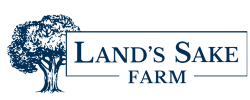by Assistant Grower Joseph Berman
This week is the one year anniversary of my ordination as a rabbi. What did I do after ordination last summer? I’ll give you a clue: I followed in the tradition of my Biblical ancestors… I attached myself to the land and headed to the farm. After spending five years in rabbinical school cooped up inside sitting and studying ancient texts, I decided that I wanted to be active, outdoors, and working with my body. I was blessed to land a gig as a summer intern at Land’s Sake where I fell head-over-heels in love with farming. Three weeks ago I returned to the farm as an assistant grower: this season I am becoming a farmer.
On the one hand, I simply came to Land’s Sake for a change of pace: after the monotony of the classroom and the disembodiment of the computer screen, being outside all day working in the dirt just seemed like the right thing to do. And it was. I love (and sometimes hate) the sweaty, dirty, back stretching work of pulling weeds. Then I really love looking back after 5 hours of weeding on our hands and knees and admiring the weed-less fennel and beet leaves blowing in the wind. And of course, I love operating the tractors. I love these pieces of the work and many others. Surprisingly though, I have also discovered that the work of farming is deeply connected to my work as a rabbi.
I have learned from my congregants at Temple B’nai Israel in Revere what community is. Community is not primarily paying membership dues or coming to services, although both of these things are an important part of community. Yet it is possible to do these things and still live with the fiction that we are autonomous individuals exist on our own. My congregants know this is not true: they are deeply concerned with the well-being of one another and they act on it. They call and visit when a member is sick, they celebrate each other’s birthdays and milestones, and they take on each other’s congregational responsibilities when someone is away or unable to do them. They have taught me that community is acting on the underlying belief that we are intimately connected to on another.
At Land’s Sake I have come to understand that this sense of community, this sense of interconnectedness, must extend beyond our own species. Sometimes we presume, in the words of the philosopher Norman Wirzba, “to be the authors of ourselves and our destinies” thinking that we “exist by, from, and for ourselves.” But this is not true, we are part of a much larger Whole. In order to live, we need to eat. In order to eat, we need to grow food. And in order to grow food, we need healthy bodies, smart flexible minds, and a well-oiled team (and tractors) but we also need healthy soil and the right amount water and animals for fertilizer and decent weather and and and… Through farming I have learned that we are dependent on things much greater than ourselves that I can only begin to comprehend. As such, I am called to live responsibly. In the words of the agrarian theologian Wendell Berry: “There is, in practice, no such thing as autonomy. Practically, there is only a distinction between responsible and irresponsible dependence.”
Make no mistake about it, farming is very hard work. It is hard on the body and we work for little pay. And yet I love it. I love it for many reasons. And chief amongst them is that I am learning not only how dependent and interconnected I am to the rest of the planet and Something much greater than myself; at Land’s Sake, I am also learning how to be responsibly dependent.



